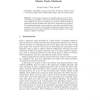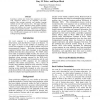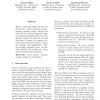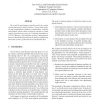427 search results - page 7 / 86 » Sequential predictions based on algorithmic complexity |
113
click to vote
ATAL
2010
Springer
15 years 23 days ago
2010
Springer
Decentralized POMDPs provide an expressive framework for sequential multi-agent decision making. Despite their high complexity, there has been significant progress in scaling up e...
121
click to vote
AMDO
2008
Springer
15 years 1 months ago
2008
Springer
Abstract. In this paper we propose an original approach to solve the Inverse Kinematics problem. Our framework is based on Sequential Monte Carlo Methods and has the advantage to a...
113
click to vote
KDD
1998
ACM
15 years 3 months ago
1998
ACM
Learning to predict rare events from sequences of events with categorical features is an important, real-world, problem that existing statistical and machine learning methods are ...
EUSFLAT
2001
15 years 1 months ago
2001
When a whole knowledge base must be derived for a fuzzy rule-based system, learning methods usually address this task with two or more sequential stages by separately designing ea...
100
click to vote
ICMLA
2008
15 years 1 months ago
2008
We revisit 26 meta-features typically used in the context of meta-learning for model selection. Using visual analysis and computational complexity considerations, we find 4 meta-f...




